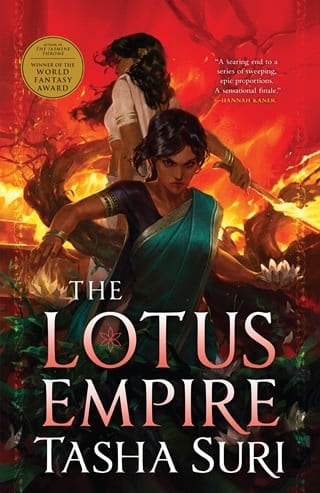Chapter 18 Priya
PRIYA
Priya knew she was dreaming. But this time she wasn’t lying on the ground with Malini’s hands on her face, her hair. She was standing and Malini was standing ahead of her.
Malini’s back was to her. Blue light haloed her, veiling her body in shadow. But Priya knew the shape of Malini’s body. She knew her narrow, firmly held shoulders and straight spine; the height of her, and the slimness, and the way she held her head—haughty, gaze direct, as sharp as an arrow.
Priya knew it all, and knew better than to approach her.
She did it anyway.
Just a dream, with her feet moving of their own accord across green-veined marble, the stone cold and grainy with river silt beneath her. Just a dream as she reached out a hand and pressed her fingertips to Malini’s spine.
Malini stiffened under her hand. Priya felt the movement of her muscles. The sharp rivulets between the joints of her spine. She was marble-stone and ivory and a riverbed. She was a force of life under Priya’s hand.
“Priya,” Malini murmured. She said her name like a curse. Began to turn her head—
“Elder Priya.” Priya opened her eyes. Her blurred vision cleared as she sat up in bed blinking. A mask-keeper, mask hooked at her waist, was standing at the doorway. It wasn’t morning yet. The room was nearly black with shadow.
“What is it?” Priya asked, keeping her voice low. She didn’t want to wake Rukh and Padma if she didn’t have to.
The mask-keeper took another step into the room, her expression grave.
“There are people, High Elder. Strangers.”
Fear ignited through her blood.
“Have the Parijatdvipan soldiers found a way into Ahiranya?” Priya demanded.
The mask-keeper shook her head frantically. “No, no. Not the soldiers. Normal people. Rot-riven. On the edge of the forest. They’re—they’re begging to be let in. We don’t know what to do.”
Priya stared at her, mouth open. She felt like a landed fish.
“They brought offerings,” the mask-keeper said, sounding as confused as Priya felt. “They’re kneeling. Some have weapons, but they’ve left them on the ground by the trees. I think— we think, those of us who were on patrol, Elder—that they’re worshippers.”
Priya rose to her feet, fumbling in the process of trying to tighten her sari. “Worshippers?” she repeated. “From—outside Ahiranya? Not our people?”
“No,” said the mask-keeper. “What should we do with them?”
More mouths to feed. Outsiders. There was a voice that sounded distinctly like Bhumika’s warning her that Hiranaprastha could not manage more people, and the mahal could certainly hold no more pilgrims. But Bhumika wasn’t here, and Priya had always been too softhearted and lacking in sense to manage this kind of shit on her own.
“I’ll see them myself,” she said.
The mask-keepers who’d been on night patrol were waiting for her at the very edge of Ahiranya, where trees rich with rot grew thickly, and thorns like spears lined the rolling green of the ground that was once a track used by farmers traveling to and fro. They had their masks on, but she could feel how unsure they were. Their faces turned toward her as she strode toward them.
“Where are they?” Priya asked.
“Close,” one mask-keeper said. He pointed outward.
Priya walked a few more steps and saw them. Maybe a hundred kneeling figures. Some young, some old. There were children among them. The people had no torches, and their faces were gray and frightened in the semidark.
There were Parijatdvipan soldiers in a perimeter all around Ahiranya. Priya had felt them in the green. Malini had left them behind. She didn’t know how this group of people had managed to evade them, and it made her stomach knot trying to imagine it.
“Have you spoken to them?”
“A little,” one mask-keeper said. “We told them not to get closer.”
She swallowed. “Good,” she said. “That’s good.”
No one could leave Ahiranya, the people in the mahal had told her. Anyone who tried to leave died, speared by thorns or swallowed by the soil.
And no one could enter, either. Walking into Ahiranya was just as deadly.
But Priya wasn’t most people.
Taking a deep breath, she stepped beyond the trees.
She could feel those people. Their knees pressed to soil. Their mouths whispering prayers. They raised their heads when she crossed the boundary. Some scrambled back with gasps of fear. Others bowed their faces to the ground in reverence.
She turned for one brief moment to look at the mask-keepers behind her in the trees. In the moonlight, the mask-keepers looked eerie, the wood concealing their faces both gleaming and shadowed. She was glad she hadn’t worn her mask; the crown mask still lay at her bedside.
She took a step forward into better light, and someone gave a shriek.
Ah. She’d forgotten her skin.
But… she assessed the faces in front of her. Leaves. Bark on fingertips and jaws. One woman had a flower growing from her throat.
The mask-keeper who’d woken her had been right. All of the strangers were rot-riven. Their skin wasn’t so different from hers after all.
All of them were silent now. Watching her.
“I heard you,” Priya said, forcing herself to be loud. Forcing her voice to carry. “I heard your worship. I am the High Elder of Ahiranya. Why are you here?”
The crowd moved uneasily. Then one kneeling figure stood. A man—broad-shouldered and scarred—stepped forward and bowed.
“Elder Priya,” he said. “We are here for your help.”
“You know my name,” Priya said, surprised.
“You’re the Ahiranyi witch,” he said, without sharpness. “The one who tried to kill our empress. Everyone knows your name.”
That shook her more than it should have. Of course people knew what she’d done. She should have expected it.
“What do you need from me?” Priya asked.
“High Elder,” he said. “We seek a new home. We seek safety.”
He spoke Zaban with a distinct accent.
“You’re from Parijat,” she said. “Why would you seek a home here?”
He hesitated. It was one of the women behind him who spoke.
“There’s nowhere safe for us anywhere else,” she said bluntly, meeting Priya’s eyes. “Our own villages turn us away. Our own people try to kill us. Imperial soldiers hunt us down, saying we’ll sicken the crops. Where else can we go?”
“We heard that if we pray hard enough, the rot can be cured,” another said tearily. “That it may not kill us after all. We’ve brought all we have. Gold, coin, food—”
“Stop,” Priya said sharply, and the worshippers fell silent.
A child was crying. She heard someone shush it.
“Please,” the man said, voice wavering. “The soldiers will be back here soon—don’t leave us here.”
She exhaled.
“Wait here,” she said. “I need to speak with the yaksa.”
In Ahiranya the mask-keepers had their heads bowed. Between them, sitting on the sheared stump of a tree, legs crossed, was the yaksa wearing Nandi’s face. He’d been waiting for her.
Priya bowed her head.
“Yaksa,” she said. “I was coming to seek you out.”
“We knew,” he said. “We heard them. Their prayers. And you.” The chiming rustle of leaves; the click of Nandi’s neck as he looked at each of the mask-keepers, then looked at her. “They cannot enter,” Nandi said. “They’re not wanted. Ahiranya is a closed place. Our place.”
“They need help because of what you’ve made of the world,” Priya said, without thinking. She heard one of the mask-keepers hiss under their breath and bit back her own curse.
Foolish. She should have thought before saying it. But it was true , so she pressed on.
“They’re rot-riven,” she said. “They’re what you made, yaksa. They belong here. So let me bring them where they belong.”
“You are a temple elder,” Sendhil said, from somewhere in the trees. He emerged, his wood-whorled face dark. “You do not question. You obey us.”
She thought of Mani Ara, and of the way Priya had defied her. Mani Ara needed her, and the yaksa needed her too.
She thought of the people waiting for her permission to enter Ahiranya. Their terror and their hope.
“Mani Ara gave me the right to her power,” Priya said, raising her head. “Mani Ara bid me wield it. This is part of her power too, isn’t it? The right to order instead of obey. The right to lead . I’m letting them stay.”
Nandi’s pearly eyes were cold, his expression sharp.
“No,” he said. “That isn’t for you to decide.”
Sendhil strode toward her. She felt his fingers at the back of her neck, rough-textured, pinching to the point of pain. He was going to lower her head. He was going to show the mask-keepers that obedience could be compelled from her.
Rage flickered up in her like a candle.
She reached into herself and grasped at the power inside her.
She felt Mani Ara’s voice rise behind her teeth, hot as blood.
“You do not tell me no, Avan Ara.”
Behind her, Sendhil—no, Vata Ara , she knew his name now, as she knew her own—went utterly still. Before her, Avan stared at her with eyes that were twin moons, filled with light.
Something skittered away from Priya within her skull. Names and knowing, knowledge too big for her own brain or body. Mani Ara’s knowledge.
“Release me,” she rasped, and Sendhil—Vata Ara—did. He obeyed.
The rush of it was heady.
She heard the rustle of bodies as slowly, reverently, the mask-keepers kneeled. She watched them lower in a wave.
Vata Ara bowed with them, his great body elegantly lowering.
They were bowing to her, she realized. Because she had spoken the names of the yaksa in a voice vaster than her body, a voice that wasn’t her own.
Shaken, she forced herself to remain calm. She had to use this while she still could.
She crossed the border of Ahiranya. The rot-riven strangers scrambled to bow again.
“Come,” she said, and felt the trees behind her widen into a path, the yaksa allowing the way to part for them. “You’re welcome in Ahiranya,” she said. “If you are loyal to the yaksa, you will have a home here.”
You should understand , Priya thought of saying, that loyalty means hollowing. That loyalty may mean more than your life.
But she didn’t say it. It would have done no good. Instead she simply guided them into Ahiranya and let the trees close behind them.
 Fullepub
Fullepub 



